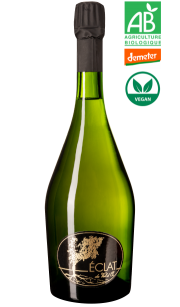

Champagne Gaiffe Brun
An atypical winemaker and an unusual house!
David is not your typical Champagne winemaker as he was a fireman in Paris before deciding to return to his native Champagne region. He has been producing certified biodynamic champagnes since 2015, although his vines have not seen a drop of weedkiller for over 30 years!
Gaiffe Brun is a unique style and craft: 0 added sugar, only champagnes in unclaimed vintages, hardly any sulphites, all handmade and wines aged... to music.
Gaiffe Brun champagnes are simply exceptional!

Terroir of Gaiffe Brun champagne
The Gaiffe Brun house is above all a series of surprises, and among these, the first is surely for the neophyte to discover a Premier Cru champagne in the Marne Valley.
The reputation of Champagne, and of certain terroirs in particular, is such that one might tend to think only in terms of crus, which is a misconception. Generally speaking, it is believed that the Grands Crus champagnes are found primarily in the Côte des Blancs, and to some extent, with the Premiers Crus, in the Reims Mountain. Yet, some villages in the Marne Valley also benefit from this appellation. Among these villages is Avenay-Val-d'Or, the birthplace of the Gaiffe-Brun family, where the estate is established.
House history
As with many winegrowing families, winegrowing is a passion passed down from generation to generation. Behind the Gaiffe Brun brand, four generations of winegrowers have succeeded one another. But here, more than just blood, it is the daughters of the family who make the winemaker!
For two generations, the tradition appears to have been established in the family and it is the sons-in-law who have taken over the family business. First Gérard Gaiffe in his time, and today David Hentzien who was not initially a typical Champagne winegrower. After a long apprenticeship with his father-in-law, Gérard, he finally took over the family business. He then continued the work started long ago by his father-in-law before him.
Biodynamics according to Gaiffe Brun
The Gaiffe Brun champagne is certified organic and Demeter since the 2015 vintage, but the family's commitment is much older. For more than 30 years now, the vines have been maintained solely by ploughing the land.
In reality, the journey towards organic viticulture is quite natural, and always involves a quest for knowledge and learning. It is above all a need to work in harmony with nature and with the permanent desire to limit inputs into the vineyard and the wine as much as possible. Biodynamic viticulture quickly became the path to follow for Gérard and David. It respects the living world, its rhythm and its search for balance, while continuing to produce what nature wants to offer.
Today, interventions are limited to a strict minimum so that the delicate balance between terroir, grape varieties and the winemaker's "touch" can be achieved without altering the wine. The vines of Gaiffe Brun champagne are cultivated biodynamically, which means that everything is done so that the vine can draw from the limestone or clay-limestone soils the unique minerals that have made the reputation of Champagne. This unusual and unparalleled depth of root in conventionally grown vines allows all the characteristics of a terroir to be revealed.
Today, biodynamics is expressed on a daily basis at Gaiffe Brun by a series of actions carried out for the benefit of this living equilibrium. The ploughing of the vines is carried out and grass cover is encouraged as much as possible, recreating life where only desert remained between the rows of vines. Insecticides are excluded and replaced by herbal teas or plant decoctions. Based on the same principle, natural preparations (horsetail, nettle, meadowsweet, dandelion, buckthorn, yarrow or cider vinegar) are used to protect the vines instead of synthetic fungicides.
Gaiffe Brun champagnes
As a result of all these efforts, the grapes harvested from the Gaiffe Brun vineyards are profoundly imprinted by their terroir and the mark that each year leaves on it. With such typicality, David has chosen to leave nature free to express its full potential. The whole range is therefore dosed as Brut Zéro, which means that no sugar is added to "perfect" the wine. All the champagnes are made in a traditional way, without filtering, chilling or fining. All operations, from bottling to sale, are done manually (manual riddling on desks, disgorging, dosage, corking, muzzling, dressing).
The sulphite levels in the wines are understandably extremely low (below 20 mg/l). It is therefore possible to call them wines with no added sulphites. An extremely rare practice in champagne, all the champagnes are vinified in unclaimed vintages (year not shown on the label) in order to preserve all the typicity of each year. Lastly, the champagnes of the house are aged in oak barrels and in music for 11 months before being aged at least 3 years in the cellar.
Champagne maturation to music ?
The practice might be surprising!
Yet, Krug itself has experimented with the concept, not by playing music in the cellar, but by organising champagne and music tastings, even going so far as to compose a symphony for the occasion.
On the winemaker side, David is probably one of the few winemakers who consistently plays music in his cellar. This is not just radio music, but classical music by great composers. These soft symphonies propagate their waves which reverberate on the barrels, the vats and, in the end, make the wine itself vibrate.
The principle may be surprising, but the result is there and above all the fruit of a very long improvement process. The Gaiffe Brun champagnes are certainly exceptional, full of character, complex and frank. True connoisseurs' champagnes, they are not only reserved for them - they are even magnificent ambassadors of biodynamics and the real potential of the Champagne terroirs.





